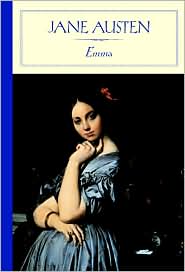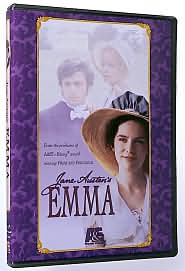“I seem to have been doomed to blindness.”
E mma Woodhouse, “handsome, clever, and rich,” is the 21-year-old daughter of the elderly owner of Hartfield, the largest estate in Highbury. Though only a couple of hours away from London by carriage, Highbury regards itself as an isolated and virtually self-contained community, with the Woodhouse family the center of social life and at the top of its social ladder. Emma, doting on her hypochondriac father, whom she represents to the outside world, has grown up without a mother’s softening influence, and at twenty-one, she is bright, willful, and not a little spoiled.
mma Woodhouse, “handsome, clever, and rich,” is the 21-year-old daughter of the elderly owner of Hartfield, the largest estate in Highbury. Though only a couple of hours away from London by carriage, Highbury regards itself as an isolated and virtually self-contained community, with the Woodhouse family the center of social life and at the top of its social ladder. Emma, doting on her hypochondriac father, whom she represents to the outside world, has grown up without a mother’s softening influence, and at twenty-one, she is bright, willful, and not a little spoiled.
Having too little to do to keep out of trouble, Emma’s hobby is matchmaking, “the greatest amusement in the world.” Unfortunately, her sophistication in the social graces does not extend to much insight into human beings. Taking Harriet Smith, a young woman of “questionable birth” under her wing, Emma makes Harriet her “project,” educating her in the social graces, convincing Harriet not to marry farmer Robert Martin, who has courted her, and ultimately  persuading Harriet that the vicar, Mr. Elton, is falling in love with her.
persuading Harriet that the vicar, Mr. Elton, is falling in love with her.
Bored and without a large circle of “suitable” friends, Emma is an incorrigible meddler, playing with the lives of those around her, snubbing those she considers inferior, gossiping about others in an attempt to divert attention to herself, and misreading intentions. Only Mr. Knightly, sixteen years older than Emma and a friend of her father, stands up to Emma and tells her what he thinks of her behavior, and it is through him that she eventually begins to grow.
Love and the formal protocol of marriage are a major focus here, with marriage more often a merger of “appropriate” families than the result of romance or passion. Class distinctions, acknowledged by all levels of society, limit both personal friendships and romantic  possibilities, and as Emma’s matchmaking fails again and again, causing grief to many of her victims, Emma begins to recognize that her pride, willfulness, and love of power over others have made her oblivious to her own faults. Austen shines in her depiction of Emma and her upperclass friends, gently satirizing their weaknesses but leaving room for them to learn from their mistakes-if only they can learn to recognize the ironies in their lives. Though Emma may be, in some ways, Austen’s least charming heroine, she is certainly vibrant and, with her annoying faults, a most realistic one.
possibilities, and as Emma’s matchmaking fails again and again, causing grief to many of her victims, Emma begins to recognize that her pride, willfulness, and love of power over others have made her oblivious to her own faults. Austen shines in her depiction of Emma and her upperclass friends, gently satirizing their weaknesses but leaving room for them to learn from their mistakes-if only they can learn to recognize the ironies in their lives. Though Emma may be, in some ways, Austen’s least charming heroine, she is certainly vibrant and, with her annoying faults, a most realistic one.
Notes: Several film adaptations, including one by the BBC and one by A & E, are available for this novel.
Also reviewed here: PERSUASION, MANSFIELD PARK, and LADY SUSAN.
